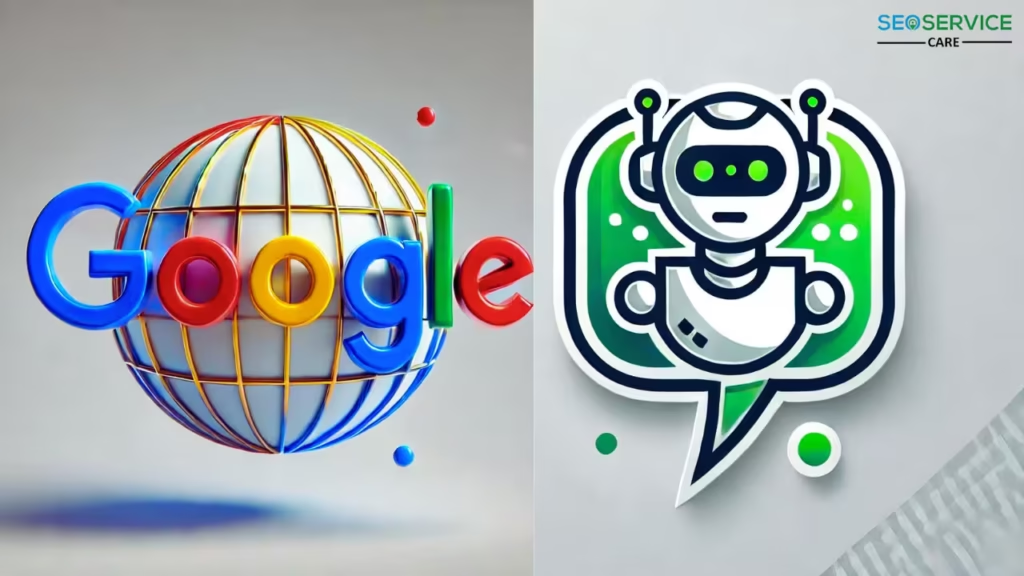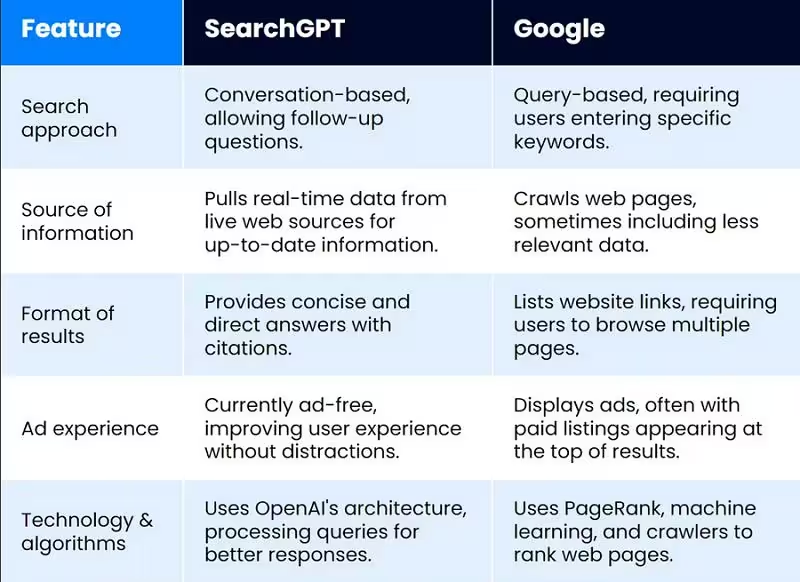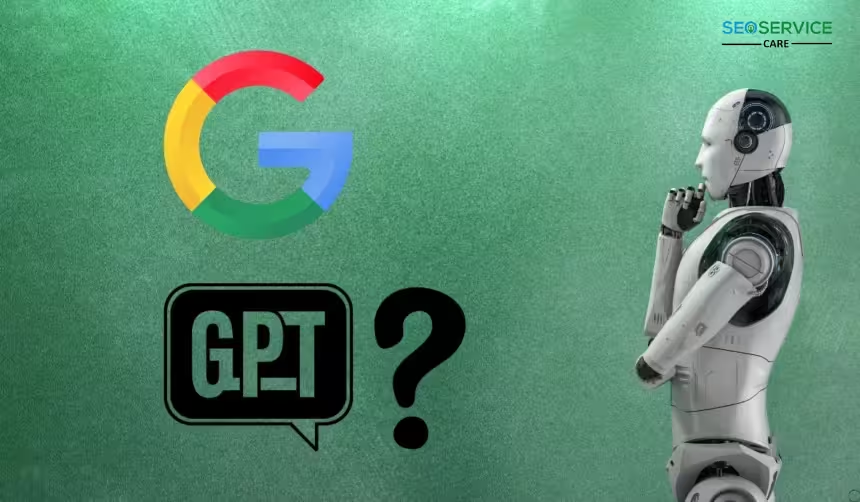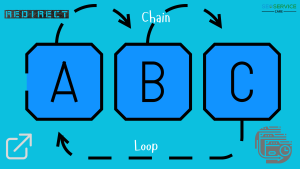In today’s world, businesses and content creators know how important it is to show up in search engine results. When people search for information online, they rely on search engines to find what they need. But now, a new way of finding information is gaining attention: SearchGPT. So, which should you optimize for: SearchGPT or Google? Let’s break it down.
What Is Google?
Google is the biggest search engine in the world. It helps people find websites, articles, videos, products, and much more. Google uses a complex system of algorithms to decide what information should appear when someone types a search query. It has been around for over two decades, and billions of people use it every day.
How Google Works ?
Google works by crawling websites on the internet and indexing them. When you type a question or phrase into Google, it looks through this index and ranks pages based on relevance, authority, and quality. Google wants to give users the best answer to their query as quickly as possible.
Why You Optimize for Google ?
- Huge Audience: Google has over 90% of the search market share, meaning most of your audience is searching on Google.
- Established Authority: Google has a long history of ranking high-quality content. It’s trusted by users and businesses alike.
- Sophisticated Tools: Google has many tools like Google Search Console and Google Analytics to help track and improve SEO efforts.
What Is SearchGPT?

SearchGPT is a new and innovative search engine tool powered by artificial intelligence (AI). It combines natural language processing and machine learning to understand and respond to user queries more conversationally. Unlike traditional search engines, which provide a list of links, SearchGPT answers questions directly, often summarizing information in a chat-like format.
How SearchGPT Works ?
SearchGPT is built on advanced AI language models, like OpenAI’s GPT (Generative Pretrained Transformer). This allows it to process queries in a more human-like way, making the experience feel more like chatting with a knowledgeable assistant. When you ask a question, instead of just providing links, it might give a direct answer, generate text, or offer a suggestion.
Why You Might Optimize for SearchGPT ?
- User-Focused Answers: SearchGPT often provides direct, concise answers to questions, reducing the need for users to click through multiple sites.
- Innovative Technology: SearchGPT represents the future of search engines by incorporating conversational AI into search results.
- Engaging Experience: For certain industries, SearchGPT can help you engage with customers in a more personalized and interactive way.
SearchGPT vs. Google: Key Differences

Now that we know what each platform does, let’s compare the two side by side.
-
Search Results Display
Google:
- Google typically provides a list of links that lead to web pages.
- Results can include a mix of organic listings, ads, images, videos, and rich snippets.
- The user has to click on a link to get more detailed information.
SearchGPT:
- SearchGPT often provides a direct answer in the chat or conversational format.
- You get a concise response without needing to click through multiple links.
- It’s designed to answer questions quickly, sometimes with additional details or context.
-
User Intent and Interaction
Google:
- Users typically search for information by typing keywords into the search bar.
- Google serves up a list of results where users can click through and explore multiple pages to gather information.
- Google’s algorithm is focused on providing a wide range of links to cover different perspectives on a topic.
SearchGPT:
- SearchGPT is designed to understand more complex and conversational queries.
- It’s optimized for providing a direct answer to user questions.
- The interaction is more like a conversation, and users don’t need to click through pages to get information.
-
Optimization Focus
Google:
- SEO (Search Engine Optimization) for Google focuses on improving a website’s ranking in search results.
- It involves targeting keywords, creating high-quality content, optimizing site speed, mobile-friendliness, and building backlinks.
- Google’s ranking system is based on relevance, authority, and user experience.
SearchGPT:
- Optimization for SearchGPT is more about making content easily understandable by AI models.
- It requires clear, concise, and well-structured content.
- The goal is to ensure that the AI can extract relevant information quickly and deliver it in a way that matches user queries.
-
Search Experience and User Behavior
Google:
- Google results often lead users to external websites.
- Users engage by clicking, scrolling, and exploring different sources.
- Many users expect to be directed to a variety of sources to form a well-rounded view of a topic.
SearchGPT:
- SearchGPT’s goal is to keep users within the platform by offering direct answers.
- The interaction is more about conversation and less about visiting multiple websites.
- Users may get a summary of key information without having to dig through many sources.
Which One Should You Optimize For?
Now that we’ve explored the key differences, let’s look at which platform is best to optimize for. The answer depends on your business goals, audience, and type of content.
Why You Should Optimize for Google?
- Larger Audience: Google is still the dominant search engine. If you want to reach the largest possible audience, focusing on Google SEO is crucial.
- Long-Form Content: Google is great for long-form content, blog posts, product pages, and resources. If your business depends on driving traffic to your website, Google is where you’ll get the most visibility.
- Search Intent Variety: Google supports a wide variety of search intents, including informational, transactional, and navigational. You can target specific keywords to meet different types of user needs.
- Established SEO Practices: SEO for Google is well-documented and proven. There are many tools and resources to help improve your ranking and track your performance.
Why You Should Optimize for SearchGPT ?
- AI-Powered User Experience: If your audience is likely to use AI-powered tools or platforms like SearchGPT, optimizing for conversational AI might be beneficial.
- Direct Answers: For businesses that offer clear, direct answers to common questions (e.g., product specifications, definitions, or quick guides), SearchGPT can deliver that information without requiring users to click away.
- Future-Proofing: SearchGPT represents the future of search. As AI continues to evolve, optimizing your content for AI-driven platforms can keep you ahead of the curve.
- Niche Markets: If your business is in a niche market where people are likely to use conversational AI for specific answers, optimizing for SearchGPT can help you stand out in that space.
How to Optimize for Google ?
- Keyword Research: Use tools like Google Keyword Planner or Ahrefs to identify the best keywords for your business.
- Create High-Quality Content: Google loves content that answers user queries. Make sure your content is detailed, well-written, and engaging.
- Improve User Experience: Ensure your website loads fast, is mobile-friendly, and offers a smooth user experience.
- Backlinks: Build high-quality backlinks from trusted sites to improve your site’s authority.
- Technical SEO: Make sure your site is properly indexed, has a clear site structure, and is free from technical errors.
How to Optimize for SearchGPT ?
- Clear and Concise Content: Write in a way that is easy for AI to process. Avoid overly complex jargon and long sentences.
- Answer Questions Directly: Focus on providing direct answers to common questions related to your business.
- Use Structured Data: Implement schema markup to help SearchGPT understand the context of your content.
- Natural Language: Use natural language that sounds conversational, as SearchGPT is built to understand human-like queries.
- Provide Context: Offer enough context in your content to help SearchGPT give relevant responses.

Conclusion
So, which one should you optimize for: SearchGPT or Google? The answer is, it depends.
- If you want to reach a larger audience and focus on traditional search results, Google is still the king. It’s where most people are searching and engaging with content.
- However, if you want to stay ahead of the curve and engage with users who are adopting AI-powered search, optimizing for SearchGPT can give you a competitive edge.
Optimize your online presence for AI technology today to improve search engine visibility and stay ahead of the competition. The expert team at SEO Service Care can enhance your website and content strategy to tap into this growing market opportunity.
Contact us with a strategist and start the process. Stay ahead of technology trends with SEO Service Care and gain deeper insights into how emerging innovations can impact your business
In reality, both Google and SearchGPT will coexist, and businesses may need to optimize for both platforms. By understanding the strengths and weaknesses of each, you can develop an SEO strategy that caters to both traditional search engines and the future of AI-driven queries.






